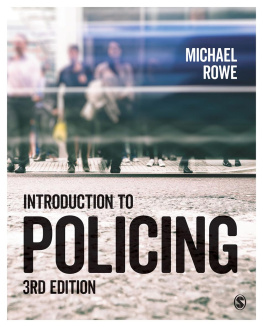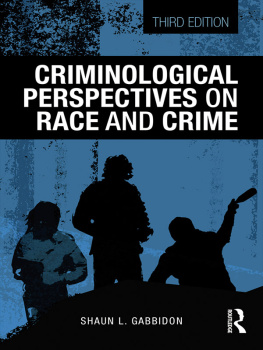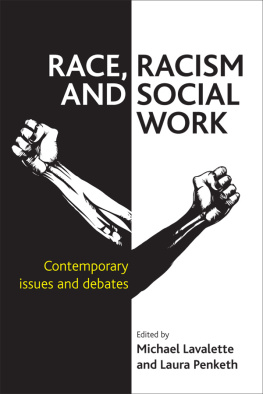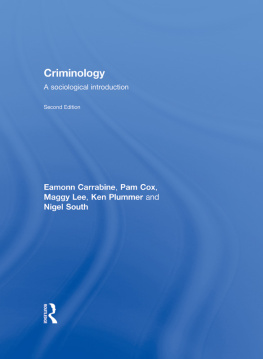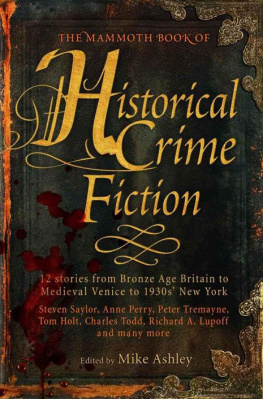Race & Crime
Race & Crime
The Key Approaches to Criminology series is intended to help readers make intellectual connections between subjects and disciplines, and to understand the importance of studying crime and criminal justice within a broader context. There are surprisingly few books that synthesize concepts, theories and research concerning race and crime and in criminology race is a subject that is frequently overlooked or is one that, at best, is confined to a single chapter in a textbook, as if issues of diversity and discrimination do not permeate all aspects of crime and justice. As someone who has researched topics as varied as the inner-city riots of the 1980s and 1990s, policing post-Macpherson, and youth perspectives on race and the criminal justice system, as well as establishing himself as a leading expert in the field of race and crime more broadly, Mike Rowe is ideally placed to write this volume. Race and Crime demonstrates the breadth, depth and richness of the field, encompassing social constructions and historical perspectives, representations and (mis)perceptions. Capturing some of the most controversial and pressing issues of our time, Rowe sheds new light on disproportionality in sentencing, racial biases in punishment, the challenges of policing a multi-racial society and the failures of criminology to adequately interrogate these issues or to problematize a concept that is, he argues, fundamentally flawed. This book is, then, the most up-to-date and comprehensive of its kind. Using contemporary and international examples throughout and providing vivid historical context, Rowe addresses topics ranging from colonialism and imperialism to human rights, and from eugenics and the Holocaust to terrorism and fears around security in the 21st Century. The scope, range and depth of this book is truly impressive and it is a welcome addition to the Key Approaches series.
Yvonne Jewkes
Series Editor
Race & Crime
A Critical Engagement
Michael Rowe
Michael Rowe 2012
First published 2012
Apart from any fair dealing for the purposes of research or private study, or criticism or review, as permitted under the Copyright, Designs and Patents Act, 1988, this publication may be reproduced, stored or transmitted in any form, or by any means, only with the prior permission in writing of the publishers, or in the case of reprographic reproduction, in accordance with the terms of licences issued by the Copyright Licensing Agency. Enquiries concerning reproduction outside those terms should be sent to the publishers.
SAGE Publications Ltd
1 Olivers Yard
55 City Road
London EC1Y 1SP
SAGE Publications Inc.
2455 Teller Road
Thousand Oaks, California 91320
SAGE Publications India Pvt Ltd
B 1/I 1 Mohan Cooperative Industrial Area
Mathura Road
New Delhi 110 044
SAGE Publications Asia-Pacific Pte Ltd
3 Church Street
#10-04 Samsung Hub
Singapore 049483
Library of Congress Control Number: 2011936824
British Library Cataloguing in Publication data
A catalogue record for this book is available from the British Library
ISBN 978-1-84920-726-3
ISBN 978-1-84920-727-0
Typeset by C&M Digitals (P) Ltd, Chennai, India
Printed and bound by CPI Group (UK) Ltd, Croydon, CR0 4YY
Printed on paper from sustainable resources
Contents
Acknowledgements
There are many people that I would like to thank for helping me to shape ideas discussed in this book. Current and former colleagues at Northumbria University, Victoria University Wellington and at the University of Leicester at each of which I have taught modules covering topics addressed here have always provided a supportive and collegiate environment. Other colleagues have also contributed ideas and discussion. In particular I would like to thank Adrian Beck, Neil Chakraborti, Bankole Cole, Adam Edwards, Jon Garland, Jamie Harding, Fiona Hutton, Nasar Meer, Michael Shiner, Matt Smith, Sarah Soppitt, Lizzie Stanley and Colin Webster.
Particular thanks are due to Yvonne Jewkes, who is not responsible for the content of what follows but is largely responsible for the fact that the book came into existence. Sarah-Jayne Boyd and Natalie Aguilera, at Sage, have been supportive and tolerant in equal measure and I am grateful to the anonymous reviewers who helped improve chapters along the way.
As always, the most significant debt is owed to Anna, Derry, Maggie and Niall, and the book is dedicated to them with love and thanks.
1
Race, Crime and Society
CONTENTS
Introduction
The Social Construction of Race
The Social Construction of Crime
Race and Crime: a Critical Engagement
Structure of the Book
Summary
Study Questions
Further Reading
OVERVIEW
This chapter provides:
- critical consideration of the ways in which race and crime are socially constructed concepts that have no inherent ontological validity and so do not exist as natural phenomena with independent properties;
- an outline of the nature of the critical engagement between race and crime that forms the central theme of this book;
- an overview of the structure and chapters of the book.
KEY TERMS
Introduction
So pervasive and long-standing are the associations between race and crime that it might seem unnecessary to begin by critically examining the fundamental terms and concepts that form the backbone of the book. It has become axiomatic that issues of race are central to the criminological cannon. Unquantifiable intellectual effort and research grant expenditure has been focused over many decades and across many societies in a vast array of studies that have sought to measure associations between race and crime in terms of patterns of offending, experiences of victimization, treatment by the criminal justice system and the impact and status that these have had in terms of social and political debates and media representation. A reasonable working definition of criminology is that it is a discipline concerned with the study of crime and social responses to crime (Mannheim, 1965): as the rest of this book demonstrates, debates relating to race have been recurrent themes in relation to both of these dimensions of the discipline of criminology since it emerged in the nineteenth century. The relationship between race and crime is a near ubiquitous feature of undergraduate and postgraduate degree programmes in criminology and criminal justice in many parts of the world. Official statistics relating to race and crime are collated, analyzed and debated in many societies. Even in those countries that do not provide apparently authoritative profiles of the racial component of criminal justice activity, the status of minority groups, indigenous peoples, asylum-seekers and migrants is often subject to intense political and social debate. Recently, Bowling (in Gabbidon, 2007) referred to criminologys quiet obsession with race and crime. While the implication that the concept of race has surreptitiously informed broad swathes of the discipline is apposite, the content of this book further illustrates that criminologys interest in race has often not been clandestine, marginal or softly-spoken.


